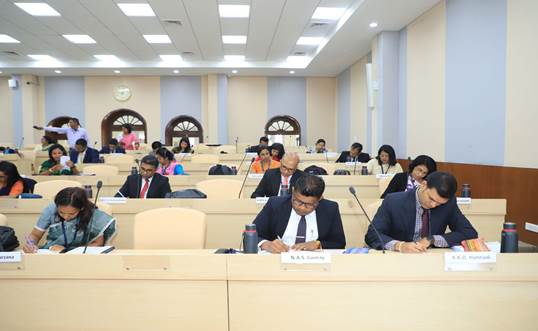The 3rd capacity building program for senior civil servants of Sri Lanka organized by the National Centre for Good Governance (NCGG) from 13th May 2024 to 24th May 2024 at Mussoorie. The program is being attended by 41 senior civil servant officers from Sri Lanka working under capacities as Assistant Divisional Secretaries, Assistant Secretaries, Deputy Secretaries, Directors, Senior Assistant Secretaries, Assistant Directors, Deputy Directors, Assistant Directors, from the PM Office, Presidential Secretariat, Department of National Police Commission, Commission to Investigate Allegations of Bribery or Corruption, National Audit Office, Attorney General Department, Department of External Resources, Finance Commission, Department of National Budget, Ministry of Finance, Department of IT Management, Ministry of Finance among others.
The NCGG, an autonomous institution under the Department of Administrative Reforms and Public Grievances, Ministry of Personnel, Public Grievances and Pensions, Government of India, is committed to action research, studies, and capacity building in public policy and governance at both the national and international levels. NCGG’s efforts align with the Indian philosophy of ‘Vasudhaiva Kutumbakam’ i.e. “The world is one Family” and emphasizes strengthening bilateral ties and fostering cooperation with other countries.

Shri V. Srinivas, Director General of the National Centre for Good Governance (NCGG) and Secretary of the Department of Administration Reform and Public Grievances (DARPG), inaugurated the session and highlighted the significant milestone achieved with the participation of fourteen senior civil servant officers from Sri Lanka in the 1st Capacity Building program led by Secretary to the Prime Minister of Sri Lanka, Mr. Anura Dissanayake. In his address, Shri Srinivas emphasized the commonalities between India and Sri Lanka in governance practices and the potential for mutual learning. He emphasized on fostering closer ties between the government and its citizens. Central to this vision is the concept of “Maximum Governance, Minimum Government,” emphasizing digitally-driven governance with a citizen-centric approach.
During the formal introduction, Dr. AP Singh, Associate Professor and Course Coordinator, provided an insightful overview of the operational framework of the National Centre for Good Governance (NCGG) and the remarkable progress achieved since its establishment. He elaborated on the program’s objectives, which are meticulously designed to impart knowledge about various policies and governance strategies in India that can be replicated for the betterment of society. Dr. Singh further delineated the session details, covering a diverse range of topics such as the Overview of All India Services, Constitutional Foundation of Policy Making, and Decentralization in India. Additionally, sessions focused on crucial aspects including Public Contracts and Policies, the Role of E-office in Effective Office Administration, and the Changing Paradigm of Governance.
The program delves into specific policy areas such as Skill Development, Agriculture, Disaster Management, and Healthcare initiatives like the Ayushman Bharat Pradhan Mantri Jan Aarogya Yojana. Participants will gain insights into transformative policies such as Right to Service, Housing for All leveraging digital technology, and the Digital India initiative. Moreover, the program offered sessions on Planning Eco-Friendly Smart Cities, Aadhar as a tool for Good Governance, and Gender & Development, among others. Emotional Intelligence, Land Record Management, and National Security were also explored in detail. Additionally, sessions on Election Management in India and Indo-Sri Lanka Relations enriched participants’ understanding of strategic governance areas

The program also features immersive field visits to prestigious institutions including the Indira Gandhi Forest National Academy (IGFNA) and the Forest Research Institute (FRI) in Dehradun, providing practical exposure to governance mechanisms. Visits to the Cyber Security Cell in Noida and the National Institute of Solar Energy, along with the International Solar Alliance in Gurugram, offered firsthand insights into cutting-edge technologies and initiatives shaping governance practices. To enhance participants’ understanding of administrative processes, exposure visits to District Gautam Budh Nagar and Pradhanmantri Sanghralaya, with a visit to the iconic Taj Mahal, are also planned for the participants.
National Centre for Good Governance (NCGG) in partnership with MEA, has imparted training to civil servants of 17 countries, viz. Bangladesh, Kenya, Tanzania, Tunisia, Seychelles, Gambia, Maldives, Sri Lanka, Afghanistan, Laos, Vietnam, Nepal, Bhutan, Myanmar, Ethiopia, Eretria, and Cambodia. The capacity building program will be supervised by Dr. A.P Singh, Associate Professor and Course Coordinator, Dr. M.K Bhandari, Associate Course Coordinator & Faculty, NCGG, Shri Sanjay Dutt Pant, Program Assistant NCGG.

Comments are closed.